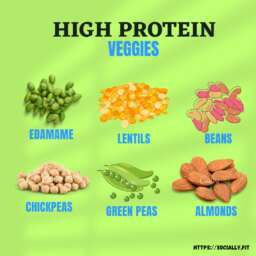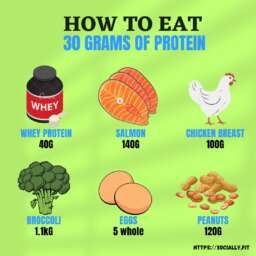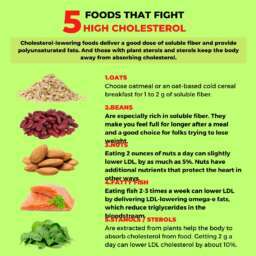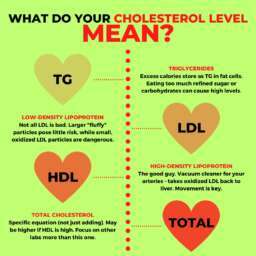Does Biotin Cause Weight Gain? Tips for Maintaining a Healthy Weight: Effective Weight Management Strategies
Introduction
In this article, we’ll explore the relationship between biotin and weight gain. Biotin, also known as vitamin B7 or vitamin H, is a water-soluble B-complex vitamin that plays a crucial role in various metabolic processes within the body. It is often associated with promoting healthy hair, skin, and nails. However, some individuals have expressed concerns regarding the potential for biotin to cause weight gain. To address these concerns, we’ll delve into the definition of biotin and provide an explanation of weight gain in the following sections.
What is Biotin?

Biotin, also known as vitamin B7 or vitamin H, is a water-soluble vitamin that is essential for various metabolic processes in the body. It serves as a coenzyme in the metabolism of carbohydrates, fats, and proteins, helping to convert these macronutrients into energy that the body can use. Biotin also plays a crucial role in maintaining the health of the nervous system, liver, hair, and skin.
Role of Biotin in the Body
One of the primary functions of biotin is its involvement in the metabolism of macronutrients. It acts as a cofactor for several enzymes involved in key metabolic pathways, including gluconeogenesis, fatty acid synthesis, and amino acid metabolism. Biotin helps to activate these enzymes, facilitating the breakdown and utilization of carbohydrates, fats, and proteins for energy production and other cellular processes.
In addition to its role in metabolism, biotin is important for maintaining the health of tissues such as the skin, hair, and nails. It helps to promote the growth and strength of hair and nails, as well as supporting the overall integrity of the skin. Biotin also contributes to the synthesis of fatty acids, which are essential components of cell membranes and play a role in skin health.
Does Biotin Cause Weight Gain
Food Sources of Biotin
Biotin is naturally found in a variety of foods, including both plant-based and animal-based sources. Some of the best food sources of biotin include:
- Eggs: Egg yolks are a rich source of biotin, providing approximately 10 micrograms per large egg.
- Meat and poultry: Lean meats such as liver and chicken breast contain significant amounts of biotin.
- Fish: Certain types of fish, including salmon and sardines, are good sources of biotin.
- Dairy products: Milk, cheese, and yogurt contain moderate amounts of biotin.
- Nuts and seeds: Almonds, peanuts, sunflower seeds, and walnuts are rich in biotin.
- Whole grains: Whole grains such as oats, barley, and wheat germ are good sources of biotin.
- Legumes: Beans, lentils, and chickpeas provide biotin along with other essential nutrients.
Including a variety of these biotin-rich foods in your diet can help ensure an adequate intake of this essential vitamin. However, certain factors such as cooking methods and food processing can affect the bioavailability of biotin in foods.
Understanding Weight Gain

Weight gain is a multifaceted phenomenon influenced by various factors, including genetics, diet, physical activity levels, hormonal balance, and environmental factors. Understanding these contributing factors is essential for managing weight effectively and promoting overall health and well-being.
Factors Contributing to Weight Gain
- Genetics: Genetic factors play a significant role in determining an individual’s susceptibility to weight gain. Certain genetic predispositions can affect metabolism, appetite regulation, and fat storage, making some people more prone to gaining weight than others.
- Dietary Habits: The types and quantities of foods consumed play a crucial role in weight management. A diet high in calories, saturated fats, sugars, and processed foods can contribute to weight gain, especially when combined with sedentary behavior.
- Physical Activity Levels: Regular physical activity is essential for maintaining a healthy weight and overall fitness. A sedentary lifestyle characterized by prolonged sitting and minimal exercise can contribute to weight gain by reducing calorie expenditure and muscle mass.
- Hormonal Imbalance: Hormones play a crucial role in regulating appetite, metabolism, and fat storage in the body. Imbalances in hormones such as insulin, leptin, ghrelin, cortisol, and thyroid hormones can disrupt these processes and contribute to weight gain.
- Environmental Factors: Environmental influences, such as socioeconomic status, access to healthy foods, cultural norms, advertising, and social networks, can impact dietary choices and physical activity levels, ultimately affecting weight gain.
Does Biotin Cause Weight Gain
The Connection Between Biotin and Weight Gain

The relationship between biotin and weight gain has been the subject of scientific inquiry, with researchers seeking to understand whether biotin supplementation influences body weight. While some studies have explored this potential connection, the findings are not conclusive, and more research is needed to elucidate the relationship between biotin and weight gain fully.
Studies and Research Findings
Several studies have investigated the impact of biotin supplementation on body weight and metabolic processes. However, the results have been mixed, with some studies suggesting a potential link between biotin and weight regulation, while others have found no significant effects.
One study published in the “Journal of Nutritional Biochemistry” examined the effects of biotin supplementation on body weight and fat metabolism in mice fed a high-fat diet. The researchers observed that mice supplemented with biotin exhibited reduced body weight gain and adiposity compared to those not receiving biotin. Additionally, biotin supplementation was associated with improved glucose tolerance and insulin sensitivity, suggesting a potential role for biotin in metabolic regulation.
In contrast, a systematic review published in the “American Journal of Clinical Nutrition” analyzed the findings of multiple clinical trials investigating the effects of biotin supplementation on body weight in humans. The review concluded that there was insufficient evidence to support a significant effect of biotin supplementation on body weight or fat mass.
Does Biotin Cause Weight Gain
Can Biotin Cause Weight Gain?

Debunking Common Myths
There are several myths surrounding the idea that biotin supplementation can lead to weight gain. However, these claims lack substantial scientific evidence and may be misleading. Let’s debunk some of the common myths associated with biotin and weight gain:
- Myth: Biotin directly causes weight gain: One of the most common misconceptions is that biotin itself can directly cause weight gain.
- Myth: Biotin increases appetite: Some people believe that taking biotin supplements can increase appetite, leading to overeating and subsequent weight gain.
- Myth: Biotin promotes fat storage: Another misconception is that biotin supplementation can promote fat storage in the body, leading to weight gain.
- Myth: Biotin interferes with metabolism: Some individuals may believe that biotin supplementation interferes with metabolic processes, leading to changes in body weight.
- Myth: Biotin supplements are fattening: There is a misconception that taking biotin supplements can contribute to weight gain due to their calorie content.
Does Biotin Cause Weight Gain
Biotin for Men: Benefits and Considerations

Biotin, also known as vitamin B7 or vitamin H, is a water-soluble B-complex vitamin that is essential for various metabolic processes in the body. While biotin is often associated with promoting healthy hair, skin, and nails, its benefits extend beyond beauty to encompass overall health and well-being. Here’s what men need to know about biotin:
1. Promotes Healthy Hair: Biotin is known for its role in supporting hair health, as it helps strengthen hair follicles and promote hair growth. For men experiencing thinning hair or hair loss, biotin supplementation may help improve hair density and thickness over time.
2. Supports Skin Health: Biotin plays a crucial role in maintaining the health of the skin by supporting the production of fatty acids essential for skin barrier function. Adequate biotin levels can help prevent dryness, irritation, and other skin conditions, promoting a clear and radiant complexion.
3. Strengthens Nails: Biotin is essential for nail health, as it helps strengthen the structure of the nails and prevent brittleness and breakage. Men who struggle with weak or brittle nails may benefit from biotin supplementation to promote stronger and healthier nails.
4. Supports Metabolic Function: Biotin is involved in various metabolic processes in the body, including the metabolism of carbohydrates, fats, and proteins. Adequate biotin levels are essential for energy production, nutrient metabolism, and overall metabolic function, supporting men’s overall health and vitality.
Considerations for Biotin Supplementation:
- Dosage: The recommended daily intake of biotin for adults is 30 micrograms. Biotin supplements are available in various forms, including capsules, tablets, and gummies, with dosages ranging from 5,000 to 10,000 micrograms per serving.
- Side Effects: Biotin supplements are generally considered safe when taken as directed. However, high doses of biotin supplements may interfere with certain lab tests, leading to false results. Additionally, some individuals may experience mild side effects such as nausea, diarrhea, or skin reactions.
- Nutritional Support: While biotin supplementation can be beneficial for promoting hair, skin, and nail health, it’s essential to complement supplementation with a balanced diet rich in biotin-containing foods such as eggs, nuts, whole grains, and leafy greens.
Does Biotin Cause Weight Gain
Biotin Skin Side Effects: Understanding Potential Reactions
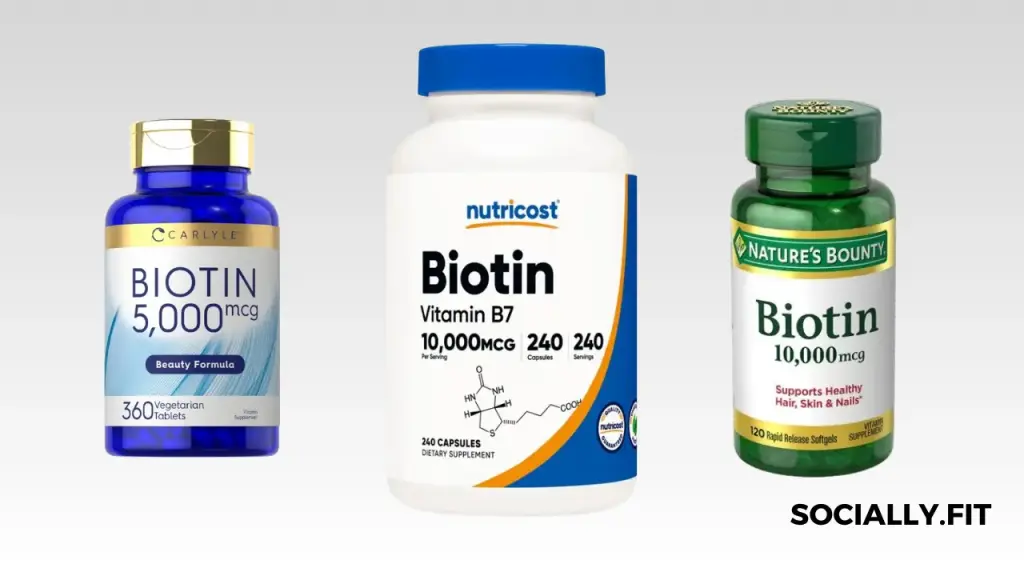
Biotin, also known as vitamin B7, earns renown for promoting healthy hair, skin, and nails. However, while most people consider biotin safe when taken at recommended doses, some individuals may experience skin-related side effects. Here’s what you need to know about biotin skin side effects:
1. Acne Breakouts: One of the most commonly reported biotin-related skin side effects is acne breakouts. Some individuals may notice an increase in acne lesions, particularly on the face, chest, and back, after starting biotin supplementation.
2. Allergic Reactions: In rare cases, individuals may experience allergic reactions to biotin supplements, leading to skin rashes, hives, itching, or swelling. Allergic reactions to biotin are typically mild but can be severe in some cases.
3. Skin Rash: Some people may develop a skin rash or irritation as a result of biotin supplementation. This can manifest as redness, itching, or dryness of the skin.
4. Eczema Flare-ups: Individuals with a history of eczema (atopic dermatitis) may experience flare-ups or worsening of their symptoms after taking biotin supplements. Eczema is a chronic inflammatory skin condition characterized by red, itchy, and inflamed patches of skin.
5. Changes in Nail Health: While not strictly a skin side effect, changes in nail health can also occur with biotin supplementation. Some people may notice an improvement in nail strength and growth, while others may experience nail brittleness or changes in nail texture.
Does Biotin Cause Weight Gain
Managing Biotin Skin Side Effects:
If you experience skin-related side effects while taking biotin supplements, consider the following tips:
- Adjust Dosage: If you suspect that biotin supplementation is causing skin issues, try reducing the dosage or discontinuing use temporarily to see if symptoms improve.
- Consult a Healthcare Professional: If skin side effects persist or worsen, consult with a healthcare professional for further evaluation and guidance. They can help determine the underlying cause of the symptoms and recommend appropriate treatment options.
- Address Underlying Conditions: If you have underlying skin conditions such as acne or eczema, work with a dermatologist to manage these conditions effectively while taking biotin supplements. They can provide personalized recommendations to minimize potential side effects and optimize skin health.
Overall, while biotin is generally well-tolerated and beneficial for many individuals, it’s essential to be aware of potential skin-related side effects. By understanding these reactions and taking appropriate measures to manage them, you can maximize the benefits of biotin supplementation while minimizing the risk of adverse effects. If you have any concerns about biotin skin side effects or its suitability for you, consult with a healthcare professional for personalized advice and guidance.
Does Biotin Cause Weight Gain
Biotin Supplements and Weight: Exploring the Impact

Biotin supplements are often touted for their potential to promote healthy hair, skin, and nails. However, some individuals may wonder about the impact of biotin supplements on weight. While biotin itself is not directly linked to weight gain or weight loss, there are several ways in which biotin supplements may indirectly affect body weight and metabolism. Here’s what you need to know about the impact of biotin supplements on weight:
1. Metabolic Function: Biotin is involved in various metabolic processes in the body, including the metabolism of carbohydrates, fats, and proteins. Adequate biotin levels are essential for efficient energy production and nutrient metabolism, which are key factors in maintaining a healthy weight.
2. Energy Production: Biotin plays a crucial role in converting food into energy that the body can use for various physiological processes, including physical activity and exercise.
3. Appetite Regulation: While taking biotin supplements, some individuals may experience changes in appetite or dietary habits, although limited scientific evidence directly supports a link between biotin supplementation and appetite regulation.
4. Muscle Growth and Maintenance: Biotin is involved in protein metabolism, which is essential for muscle growth, repair, and maintenance.
5. Overall Health and Wellness: Many people take biotin supplements as part of a holistic approach to health and wellness. This approach involves maintaining a balanced diet, engaging in regular physical activity, and managing stress levels.
Does Biotin Cause Weight Gain
Considerations for Biotin Supplementation:
- Dosage: The recommended dosage of biotin supplements varies depending on individual needs and health goals. It’s essential to follow the recommended dosage guidelines and consult with a healthcare professional before starting any supplementation regimen.
- Quality and Safety: When choosing biotin supplements, opt for high-quality products from reputable brands to ensure purity, potency, and safety.
- Individual Response: Individual responses to biotin supplementation may vary based on factors such as genetics, diet, lifestyle, and underlying health conditions. It’s essential to monitor your response to biotin supplements and adjust dosage or discontinue use if you experience any adverse effects.
Other Health Benefits of Biotin: Promoting Hair, Skin, and Nail Health
While biotin often receives recognition for promoting healthy hair, skin, and nails, it extends its benefits beyond beauty to encompass overall health and well-being. Here are some of the additional health benefits of biotin:
1. Hair Health: Biotin is essential for maintaining healthy hair follicles and promoting hair growth. Adequate biotin levels help strengthen the hair shaft, reduce brittleness, and prevent hair breakage and loss.
2. Skin Health: Biotin plays a crucial role in maintaining the health and integrity of the skin. It helps support the production of fatty acids, which are essential for maintaining the skin’s moisture barrier and preventing dryness and irritation.
3. Nail Health: Biotin is involved in the synthesis of keratin, a protein that forms the structure of the nails. Adequate biotin levels help strengthen the nails, reduce brittleness, and promote healthy nail growth.
4. Energy Production: Biotin is essential for converting carbohydrates, fats, and proteins from food into energy that the body can use for various physiological processes.
5. Metabolic Function: Biotin plays a key role in various metabolic processes in the body, including the metabolism of glucose, fatty acids, and amino acids.

Does Biotin Cause Weight Gain
How to Maintain a Healthy Weight: Tips for Weight Management
Maintaining a healthy weight is essential for overall health and well-being, reducing the risk of chronic diseases such as obesity, diabetes, and heart disease. Here are some effective tips for achieving and maintaining a healthy weight:
1. Eat a Balanced Diet: Focus on consuming a variety of nutrient-dense foods from all food groups, including fruits, vegetables, whole grains, lean proteins, and healthy fats.
2. Practice Portion Control: Pay attention to portion sizes and avoid oversized servings, especially when eating out or indulging in high-calorie foods.
3. Limit Processed Foods and Sugary Beverages: Minimize your intake of processed foods, sugary snacks, desserts, and sugary beverages such as soda, fruit juices, and energy drinks.
4. Stay Hydrated: Drink plenty of water throughout the day to stay hydrated and support optimal body function. Drinking water before meals can help promote feelings of fullness and prevent overeating.
5. Be Mindful of Emotional Eating: Pay attention to your eating habits and avoid using food as a coping mechanism for stress, boredom, or other emotions.
FAQs (Frequently Asked Questions)
- Can biotin supplements help with weight loss?
- Biotin supplements are not proven to promote weight loss directly. However, maintaining adequate levels of biotin in the body is essential for overall health, which may indirectly support weight management efforts.
- Are there any side effects of taking biotin supplements?
- Biotin supplements are generally considered safe when taken as directed. However, high doses of biotin supplements may interfere with certain lab tests, so it’s essential to inform your healthcare provider if you are taking biotin supplements.
- How much biotin should I take daily?
- The recommended daily intake of biotin for adults is 30 micrograms. However, some individuals may benefit from higher doses, particularly those with specific health conditions or dietary restrictions.
- Can biotin supplements improve hair growth?
- Scientific evidence supporting the efficacy of biotin for hair growth is limited, although many tout its potential to improve hair health. While some people may experience benefits, results can vary from person to person.
- Should I stop taking biotin supplements if I notice weight gain?
- If you experience unexpected weight gain while taking biotin supplements, it’s essential to consider other factors that may be contributing to the weight change. Consult with a healthcare professional for personalized advice.

Conclusion
Maintaining a healthy weight is essential for overall health and well-being. By following a balanced diet, practicing portion control, staying hydrated, being mindful of emotional eating, engaging in regular physical activity, prioritizing quality sleep, managing stress, and seeking support when needed, you can achieve and maintain a healthy weight effectively.
Remember that weight management is a journey that requires commitment, consistency, and patience. Small, sustainable changes to your lifestyle habits can lead to significant improvements in your health and quality of life over time. By prioritizing your health and making informed choices, you can enjoy the benefits of a healthy weight and live life to the fullest.








